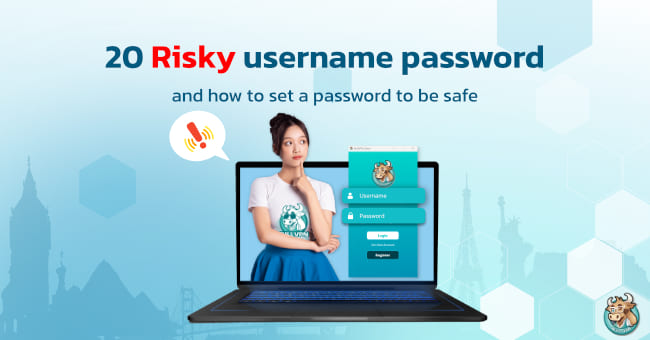
Top 20 Usernames and Passwords that should not be used
I understand that the more important the account, the more complex the password needs to be. Many people tend to set easy-to-remember passwords, which leads to forgetting about security. These become usernames and passwords that hackers can use to hack into our accounts. We should not use them. Let's take a look at what they are.
| No. | USERNAME not use | Password not use |
| 1 | root | root |
| 2 | admin | support |
| 3 | user | 111111 |
| 4 | test | admin |
| 5 | ubnt | 12345 |
| 6 | DUP ROOT | Password |
| 7 | pi | 123456 |
| 8 | guest | 1234 |
| 9 | 123321 | 123 |
| 10 | support | 1 |
| 11 | 1234 | ubnt |
| 12 | oracle | raspberry |
| 13 | mysql | user |
| 14 | nagios | pass |
| 15 | ftp | any |
| 16 | postgres | welc0me |
| 17 | 12345 | default |
| 18 | tomcat | synopass |
| 19 | ubuntu | test |
| 20 | 111111 | alpine |
| 21 | aaaaaa | 1212312121 |
| 22 | test | 987654321 |
| 23 | qwerty | qwerty123 |
| 24 | DEFAULT | password / p@ssword |
| 25 | 1q2w3e | 000000 |
| 26 | Iloveyou | Iloveyoutoo |
Cr. it24hrs , Springnews
How to set a password (Password) to be safe from hackers
1. It should have a reasonable length of about 10 - 14 Characters
The length of a password is something that should not be overlooked, but it shouldn't be too long to the point where it becomes unmemorable. A 10-character password is harder to guess than an 8-character password by a factor of 4,000! If it takes 1 day to guess an 8-character password, it would take 4,000 days to guess a 10-character password. Nowadays, many websites require a minimum password length of 8 characters, but for true security, it is recommended to use passwords of 10 characters or more.
2. Do not use common words as your password
If we are someone who loves flowers, people might guess our password as "Flower." But what if we want to use the word "flower"? What can we do? We can try reversing the word, which becomes "rewolf." We can also remove vowels and have "flwr," or place a vowel at the beginning and add letters afterward, resulting in "oeflwr." Remember that words not found in the dictionary are harder to guess than those that are. As for passwords consisting of only numbers, such as "12345678," they should be avoided as they are extremely easy to guess. The same goes for using real names, nicknames, as they are easily guessable and should not be used as passwords.
3. Blend together numbers, symbols, uppercase letters, and lowercase letters
When we use a combination of uppercase and lowercase letters, numbers, and various symbols in a password, the chances of guessing the correct password are significantly reduced. For example, the password "1A2b3C4d" is much harder to guess or crack using brute-force methods or password guessing programs compared to "1a2b3c4d" with all lowercase letters. Therefore, for enhanced security, it is advisable to always incorporate a mix of different character types in your password.
4. Type the password in English using the Thai keyboard
This method not only makes it easy to remember, but the password is also highly secure. The key is to not let others know our keywords. This method is easier for people who use PCs rather than those who use mobile devices. If you use this method, you should have some password memorization techniques as well.
5. You should not use the same password for every online account
Well, our memory isn't good, so we don't want to set multiple confusing passwords. However, we shouldn't use the same password for every account because if it gets leaked or hacked once... it would be a complete disaster. Brother Cow suggests setting a unique name for that account, such as Bullface2023*-* as an example.
But can it get even better? If we set up secure passwords and use the internet safely, don't forget to connect to BullVPN before accessing the internet. This will allow you to access data both locally and internationally without limitations. You can connect to watch movies from different countries, your favorite series, and listen to the right music from any country, anywhere in the world.





